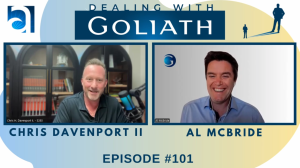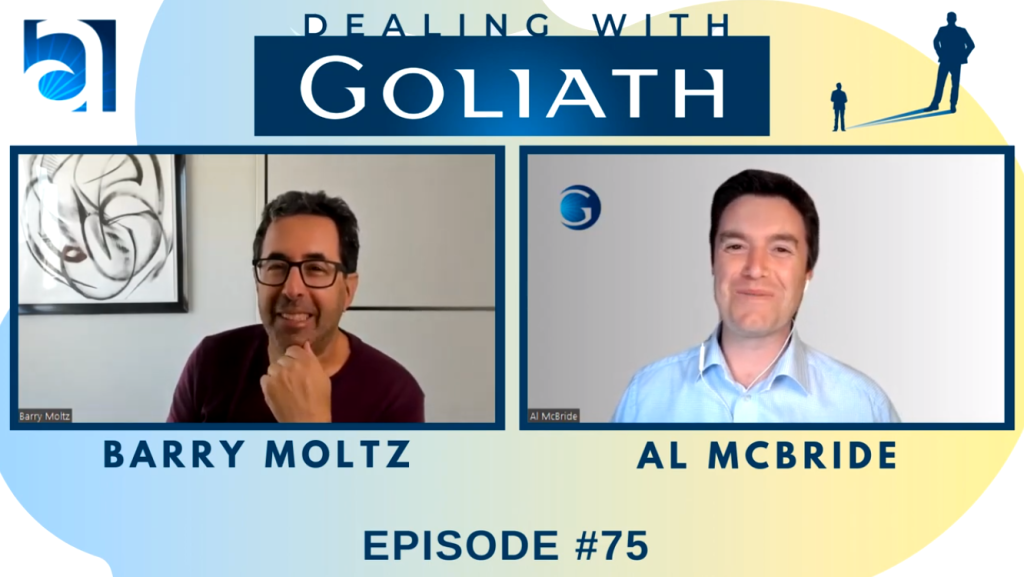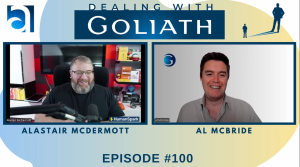

From Hub and Spoke to High Impact: Scale Up by Letting Go with Barry Moltz #075
Show Notes:
As a small business expert, Barry Moltz gets owners growing again by unlocking their long forgotten potential. For more than 20 years he has founded and run small businesses with a great deal of success and failure .
In that time Barry has discovered the formula to get stuck business owners unstuck and marching forward by applying simple, strategic steps to facilitate change.
He founded an angel investor group, an angel fund, and is a former advisory member of the board of the Angel Capital Education Foundation.
He’s appeared on many TV and radio programs and for 12 yrs has hosted the Small Business Radio Show…
Barry has authored many books, his 7th book, “ChangeMasters: How to Actually Make the Changes You Already Know You Need to Make” is out now.
Topics explored:
- The problem with running organizations as a hub and spoke system
- How to avoid bottlenecking decision-making, and inconsistency in sales and marketing efforts.
- The importance of delegating decisions and responsibilities to others to grow beyond being just an owner-operator.
- The challenge of making changes in business and how to overcome the resistance to change.
- Delegate just one decision or responsibility
- The importance of working on the business, not just in the business, to achieve business growth and fulfil ambitions.
- The power of being willing to walk away from a deal and avoiding desperation in negotiations.
- The benefits of using a third party in mergers and acquisitions advisory work to create competitive situations and bring objectivity to negotiations
Transcript
Al McBride 0:02
Welcome to the dealing with Goliath podcast. The mission of dealing with Goliath is to sharpen the psychological edge in negotiation, ethical influencing and high impact conversations for business leaders who want to be more effective under pressure, uncover hidden value, and build greater connection all while increasing profitability. This is the short form espresso shot of inside podcast interview to boost business performance, using our five questions in a roundabout 15 minutes format.
My guest today is Barry Moltz. Now as a business as a small business expert, Barry moles get owners growing again by unlocking their long forgotten potential. For more than 20 years, he’s founded and run small businesses with a great deal of success and failure. In that time, Barry’s discovered the formula to get stuck business owners unstuck and marching forward by applying simple strategic steps to facilitate change. He’s also founded an investor group, an Angel fund, and is a former advisory member of the board of the angel capital Education Foundation. He’s appeared on many TV and radio programs, and for the last 12 years has hosted the Small Business Radio Show. Barry has authored many books, his sevens, book, change masters, how to actually make the changes you already know you need to make is out now, Barry, it is an absolute pleasure to have you on the show. Welcome.
Barry Moltz 1:31
Thanks for having me. And you know, my wife has read any of them, I thought that she’d make a change and read the Seventh one, but just wasn’t to be.
Al McBride 1:39
You can’t win over all the people all the time.
Barry Moltz 1:43
You gotta hear it all the time. I want to I want to read one of your books.
Al McBride 1:48
Well, on that note, you know, let’s clarify that for people. So we mentioned small business owners, but who is your ideal client? And what’s the biggest challenge that they face?
Barry Moltz 1:56
Yeah, the ideal client is someone who’s probably been in the business three to five years and achieved enough financial success, that they can make a living at what they’re doing running their business. But it really hasn’t been the pot of gold or hasn’t really achieved all their dreams that they hope to when they first start out. So somewhere that somewhere they’re stuck. It’s usually in sales and marketing or leadership management, or they don’t really know how to keep track and manage the money.
Al McBride 2:25
Okay, very good. And so it sounds like you know, it’s come up a few times now that, as you said they’ve had that, that they’re probably pretty good at what they do. But it’s trying to reach that next level, though, they feel like they’re in a bit of a rut. So what are some of the common mistakes people make when they’re trying to solve that problem? Well, one of the mistakes
Barry Moltz 2:45
really is around people, they run their organization more as hub and spoke with the founders at the center, and everyone’s going to work through them. They never set up any kind of hierarchical organization, where people have real responsibilities to do real work and make decisions. They let your ego get in the way. So all decisions have to come through them. So it’s a it’s a big bottleneck.
That seems to be one of the biggest ones. The second one is they don’t have a consistent way where they do sales and marketing. They only do sales and marketing when they’re low on business. As soon as they get some more business as a result of that sales and marketing. They stopped doing sales and marketing. So they get stuck in what I call the double helix trap where their business just really stays flat.
Al McBride 3:30
I love that it’s great. I’ve also heard it described as random acts of marketing. And as you said, it’s that sporadic problem. So I’d imagine there’s a few people watching or listening to this show thinking, Oh, maybe I’m in a rush. Yes. So I love that analogy there of the hub and spoke, you know, it’s a common phrase. But it’s just to emphasize that point that it sounds very much like there’s a lot of owner founders who are used to wearing all the hats, they’re used to having to do all of it. And because they know best in inverted commas, as you said, they’re not using the skill set and the talents of the people that they bring on board.
Barry Moltz 4:08
Right there was a famous Harvard Business Case study called who’s got a monkey. And too many times they say the owner has to solve all the monkeys all the problems in the business, and their employees bring the prompts them because they know that the owner will solve it for them.
You know, the owner does this because a they think they can do it the best or it makes them feel important. I remember a long time ago, one of my businesses before there was a lot of email, you really have the pulse of the business when you opened up the mail of the day that came in from the post office.
And I have to tell you, it was really hard for me to give up opening the mail. Even though we had like 2030 people in our company. It was a ridiculous thing to be doing to do. But I felt like I knew exactly what’s going on when I opened up all of them now. So it’s hard to go up some of those things sometimes.
Al McBride 4:54
Absolutely. Absolutely. When you were talking about that there I got very much that feeling and you And maybe some of the listeners can, can can, would just say can relate to this, that the feeling felt like you’re not treating your team adult, an adult, you’re almost parent child, they’re like coming to you to solve every problem.
Barry Moltz 5:14
Exactly. And if you’re good, you can solve their problems, right? Just like Yeah,
Al McBride 5:20
exactly, exactly, you feel helpful, you feel paternal, or maternal if the case as the case may be absolutely. So what might be one valuable free action that the audience can implement that will help them at an issue, so might solve it, but at least have them looking down and starting down that better trajectory?
Barry Moltz 5:39
Well come up with one decision or one error responsibility that you can delegate that you’re not be involved in on a daily basis, and go to the person clearly say what the goals are. talk with them about how what you think the ways to solve this should really happen. And then let them do it.
And check in with them every week to see if it was done to the maximum success that you want. If it wasn’t make corrections, and then check in the following week. So if that works out, well, then try another area, try another set of decisions, but go slowly, just to gain confidence in what that person’s doing. And then spread among multiple people in your organization.
Al McBride 6:21
It’s fantastic observation, as you said, that you’re you’re letting go just up it slowly. But you can still be helping them, you can bring them up to speed. Do you have any other project
Barry Moltz 6:32
open, make all the decisions. Because if you make all the decisions in your business, and nothing happens, without you being involved, you really don’t have a business, you have a job, you only get a real valuable company by delegating key decisions and key areas to other people in the organization.
Al McBride 6:49
That is such a good point. And as I said, most people didn’t start their business if their founder owner, they didn’t start their business to have a job, per se did. Exactly. This is also going back to what you said at the start that is that people are stuck in that rut. And you mentioned their dreams, their ambitions haven’t really felt fulfilled, does this start to tie in with that, that you can actually, as you’re giving more away, you’re able to do higher and higher, higher value more CEO type tasks.
Barry Moltz 7:23
It’s the idea of working on your business not working in your business, you know, the the E Myth. And that’s really important if you’re going to really maximize the potential for business. And I don’t this is hard. I mean, I wrote my last book on change, because change is really hard. Your brain is a pattern making machine. And if it’s survived up to this point, it just wants to keep doing the same thing over and over again, because it thinks it’s good for you. And people usually only change when they’re in a lot of pain. And you got to get to the point where your business really isn’t working, or you’re stuck to make any of those changes.
Al McBride 8:02
And it’s turning as Tony. So what might be one valuable free resource that you could direct people to that would help them with this.
Barry Moltz 8:11
Well, I mean, listen, there’s a lot of free resources out there. Again, you can buy my book, but it’s not free, unfortunately. But you can download a free chapter from my website, very most calm and that might be able to get you started.
Al McBride 8:26
Outstanding, stunning. So what would be your number one insight or principle on how to negotiate build rapport and connection, or uncover hidden value with clients, customers or counterparts?
Barry Moltz 8:42
The best way really to negotiate for me is always be willing to walk away, don’t want it too much. I mean, the biggest promise people make, especially like negotiating the price of a home, they want, they fall in love with that home, if you’re not willing to walk away, if you don’t understand what your alternative is, if this deal doesn’t happen, then you’re in a much weaker position. If the other party believes truly that you will walk away if you don’t reach agreement, that is very powerful out.
Al McBride 9:12
That’s a great example. You know, as you said, I think a lot of people end up holding themselves hostage, essentially. If the other side thinks, oh, they’re never gonna walk away, then you’re just in that position, aren’t you? Absolutely. Absolutely.
Barry Moltz 9:26
And also desperation smells. People can tell if you’re desperate to buy something or desperate to sell something, and you can’t let that them smell that right. Because they’ll take advantage of it.
Al McBride 9:39
Absolutely, absolutely. There’s, as I usually say it’s the one with the less pronounced emotional need. That has that more control. Because as you mentioned earlier, you know, it is exactly about that. Who’s the who’s the level of control. Who’s who’s taken who hostage here I do a lot
Barry Moltz 10:01
of merger and acquisitions advisory work. And again, the reason I think while it’s good to bring it up professional is because we’re not emotional about it. It’s very difficult to sell your business because it’s all wrapped up, it’s your baby, maybe you’ll get a lot of money as a result of it. And a third party isn’t emotional about it at all. And I think that helps
Al McBride 10:20
standing certainly, it’s a very interesting idea, as he said, bringing in a third party to do some of your work, because there’s pros and cons to that. But could you just actually expand on that for a minute? What would be some of those situations where that might be advisable for business owner, as you said, because if we’re if we keep that picture that we started with earlier, you know where they’re doing, they’re hardly delegating enough. They’re probably doing all their own negotiating of their main client contracts, that kind of thing. So what would you suggest to them as to reason maybe, to look at getting in a professional to at least advise, if not to even do it or lead the negotiation themselves?
Barry Moltz 10:58
Yeah, I’ve talked about more if you’re in the process of selling your business, because if you have a third party, they can create a competitive situation where they go out to many different buyers. Plus, a third party can press a lot harder in prep, say some things that you as the owner couldn’t say, especially if you need to work with a buyer in the future. Because the third party wants to transactions done. I’m out. I’m not working with them in the future. I don’t have a have a future with the buyer where the seller might and so if Be careful, perhaps about what they might say. That’s a
Al McBride 11:33
great example. That’s a great example. That’s good to hear the good and maybe less ideal side of getting in a third party. Absolutely fantastic. Well, look, Barry, thank you so much for your time, it’s been highly illuminating. Our thanks for asking questions. Thanks.
Transcribed by https://otter.ai
Resources
Barry’s Website: https://barrymoltz.com/
Amazon Kindle Book: ChangeMasters: How To Actually Make the Changes You Already Know You Need To Make, by Barry Moltz
Amazon Book: How To Get Unstuck: 25 Ways to Get Your Business Growing Again, by Barry Moltz
Amazon Book: Small Business Hacks: 100 Shortcuts to Success, by Barry Moltz
Connect with Barry:
On LinkedIn: https://www.linkedin.com/in/barrymoltz/
Ready for more:
If you’re interested in more, visit almcbride.com/minicourse for a free email minicourse on how to gain the psychological edge in your negotiations and critical conversations along with a helpful negotiation prep cheat sheet.

